Nutrition Facts
Antioxidants
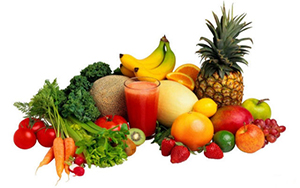 Antioxidants are substances found in foods that help protect cells in our body from damage caused by ‘free radicals’. Free radicals are around us all the time - formed during normal metabolism as well as from exposure to the environment. These free radicals are responsible for a large part of the ageing process. The main antioxidants are vitamins A, C and E, selenium and beta-carotene as well as a range of phytonutrients in plants. Antioxidants are found in a range of foods - particularly in brightly-coloured fruit and vegetables such as citrus fruits, berries, red capsicum, carrots and beetroot. People who eat their 5+ a day have lower rates of heart disease and cancer due to these antioxidants!
Antioxidants are substances found in foods that help protect cells in our body from damage caused by ‘free radicals’. Free radicals are around us all the time - formed during normal metabolism as well as from exposure to the environment. These free radicals are responsible for a large part of the ageing process. The main antioxidants are vitamins A, C and E, selenium and beta-carotene as well as a range of phytonutrients in plants. Antioxidants are found in a range of foods - particularly in brightly-coloured fruit and vegetables such as citrus fruits, berries, red capsicum, carrots and beetroot. People who eat their 5+ a day have lower rates of heart disease and cancer due to these antioxidants!
Avocado
 Did you know that avocados are a fruit? They contain around 25% fat BUT it’s the type of fat in avocados that is key – they have a high ratio of unsaturated to saturated fats (i.e. more ‘good’ fats) which makes avocados good for heart health. Avocados are also rich in vitamin E - a fat soluble vitamin which acts as a powerful antioxidant. So if you are watching your waistline, avocado is a great alternative to butter as a spread with around 1/3 the calories of butter and much healthier fats. But you still want to be mindful of how much avocado you eat – an average avocado provides around 400 calories!
Did you know that avocados are a fruit? They contain around 25% fat BUT it’s the type of fat in avocados that is key – they have a high ratio of unsaturated to saturated fats (i.e. more ‘good’ fats) which makes avocados good for heart health. Avocados are also rich in vitamin E - a fat soluble vitamin which acts as a powerful antioxidant. So if you are watching your waistline, avocado is a great alternative to butter as a spread with around 1/3 the calories of butter and much healthier fats. But you still want to be mindful of how much avocado you eat – an average avocado provides around 400 calories!
Bananas
 Bananas are a high energy fruit (1 medium banana = 100 calories) but loaded with nutritional goodness. Creamy and sweet, bananas are a favourite food for everyone from infants to elders to athletes. They are convenient to enjoy, are easily digested and provide a good source of slowly released energy (low GI). Bananas are rich in potassium – an essential mineral for maintaining blood pressure and heart function. Bananas are also a good source of fibre and vitamin C. Never throw away over-ripe bananas – chop them up and keep in the freezer for use in smoothies or baking.
Bananas are a high energy fruit (1 medium banana = 100 calories) but loaded with nutritional goodness. Creamy and sweet, bananas are a favourite food for everyone from infants to elders to athletes. They are convenient to enjoy, are easily digested and provide a good source of slowly released energy (low GI). Bananas are rich in potassium – an essential mineral for maintaining blood pressure and heart function. Bananas are also a good source of fibre and vitamin C. Never throw away over-ripe bananas – chop them up and keep in the freezer for use in smoothies or baking.
Blueberries
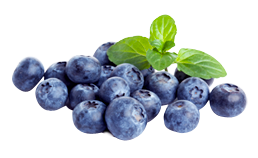 Blueberries are a great ready-to-go low-calorie snack. Fresh or frozen, blueberries are also boosting with good nutrition – mainly due to their antioxidant properties which they get from their blue colour (a phytonutrient called anthocyanins). The antioxidants in blueberries are believed to help counteract the age-related decline in brain function, as well as protect against cancer and help lower cholesterol. Blueberries are also a good source of fibre, manganese and vitamin C. So there are plenty of reasons to include these power berries in your diet! Add blueberries to your breakfast cereal, to smoothies or use in baking.
Blueberries are a great ready-to-go low-calorie snack. Fresh or frozen, blueberries are also boosting with good nutrition – mainly due to their antioxidant properties which they get from their blue colour (a phytonutrient called anthocyanins). The antioxidants in blueberries are believed to help counteract the age-related decline in brain function, as well as protect against cancer and help lower cholesterol. Blueberries are also a good source of fibre, manganese and vitamin C. So there are plenty of reasons to include these power berries in your diet! Add blueberries to your breakfast cereal, to smoothies or use in baking.
Calcium
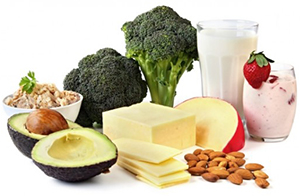 Calcium is an important bone-strengthening mineral found mainly in milk and milk products (cheese, yoghurt) but also in other foods such as canned sardines/salmon, broccoli, almonds and calcium enriched milk alternatives. Getting enough calcium is important at every life stage, so include at least 2-3 serves of low-fat milk and milk products every day to:
Calcium is an important bone-strengthening mineral found mainly in milk and milk products (cheese, yoghurt) but also in other foods such as canned sardines/salmon, broccoli, almonds and calcium enriched milk alternatives. Getting enough calcium is important at every life stage, so include at least 2-3 serves of low-fat milk and milk products every day to:
- Build strong bones and teeth for children
- Achieve peak bone mass for young people
- Maintain bone mass and prevent bone loss for adults and older people
Coconut oil
 Coconut oil has recently gained popularity for its health benefits as being a ‘superfood’. Coconut oil is composed of 92% saturated fat which is why it is solid at room temperature (just like butter). Adding coconut oil to each and every meal is not going to solve any health issues; but it may add extra calories and promote weight gain. The current recommendation from the Heart Foundation is to still use poly and monounsaturated plant oils (e.g. olive oil, canola oil) as your main oils. If using coconut oil, use it as you would with butter – in small amounts.
Coconut oil has recently gained popularity for its health benefits as being a ‘superfood’. Coconut oil is composed of 92% saturated fat which is why it is solid at room temperature (just like butter). Adding coconut oil to each and every meal is not going to solve any health issues; but it may add extra calories and promote weight gain. The current recommendation from the Heart Foundation is to still use poly and monounsaturated plant oils (e.g. olive oil, canola oil) as your main oils. If using coconut oil, use it as you would with butter – in small amounts.
Eggs
 Eggs have received somewhat of a bad rep over the years due to their cholesterol contents. But the advice now is that there is no limitation on the number of eggs healthy people should consume. Eggs are a nutritious and highly satiating food containing and vitamin D and B12, as well as high quality protein. The yellow colour of the yolk comes from two carotenoids (lutein, zeaxanthin) which are antioxidants beneficial for eye health. Eggs are super easy to cook, for example:
Eggs have received somewhat of a bad rep over the years due to their cholesterol contents. But the advice now is that there is no limitation on the number of eggs healthy people should consume. Eggs are a nutritious and highly satiating food containing and vitamin D and B12, as well as high quality protein. The yellow colour of the yolk comes from two carotenoids (lutein, zeaxanthin) which are antioxidants beneficial for eye health. Eggs are super easy to cook, for example:
- A boiled egg as a snack
- Scrambled or poached eggs on wholegrain toast
- Omelette with smoked salmon, spinach and tomato
Energy (kilojoules/calories)
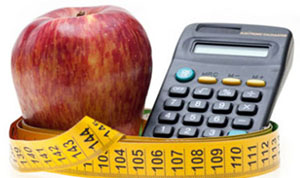 Kilojoules (kJ) are a measure of how much energy we get from consuming a food or drink. KJ and calories mean the same; they are just two different measures. To convert kJ to calories, divide by 4.184 or simply by 4. All food/drink contain calories but how many calories depends on the contents of carbohydrate, protein, fat and alcohol. Energy value per gram:
Kilojoules (kJ) are a measure of how much energy we get from consuming a food or drink. KJ and calories mean the same; they are just two different measures. To convert kJ to calories, divide by 4.184 or simply by 4. All food/drink contain calories but how many calories depends on the contents of carbohydrate, protein, fat and alcohol. Energy value per gram:
- Fat: 9 calories
- Alcohol: 7 calories
- Protein/carbohydrate: 4 calories
- Water: 0 calories
So the best option is to go for less energy dense foods with lower fat and alcohol contents and a higher water content – fruit and veges are full of water!
Gluten-free
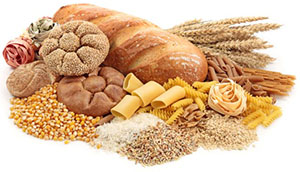 Gluten is a protein found in grains (e.g. wheat, rye) which gives bread its structure. Gluten may be a problem for those who have coeliac disease or those who are gluten intolerant. Gluten-free foods are trendy at the moment, and there are many gluten-free foods on the market including breads, muesli bars and cookies. But beware – these foods are not necessarily any healthier! Gluten-free foods often have undergone extra processing, can be high GI (glycaemic index) and are much more expensive. So if you think gluten is an issue for you, see your GP for a test before changing your diet!
Gluten is a protein found in grains (e.g. wheat, rye) which gives bread its structure. Gluten may be a problem for those who have coeliac disease or those who are gluten intolerant. Gluten-free foods are trendy at the moment, and there are many gluten-free foods on the market including breads, muesli bars and cookies. But beware – these foods are not necessarily any healthier! Gluten-free foods often have undergone extra processing, can be high GI (glycaemic index) and are much more expensive. So if you think gluten is an issue for you, see your GP for a test before changing your diet!
Honey
 Honey is often thought of as a healthier alternative to sugar, but unfortunately the nutritional benefits from honey over sugar are minimal. Calorie-wise or for people with diabetes, honey should be counted as sugar. Teaspoon for teaspoon, honey has more calories than sugar because it is denser, so using 1 tsp of honey instead of sugar actually means you are consuming more calories, not less. Honey does have B-vitamins and minerals but the amounts are tiny. So just remember, honey is still a form of sugar – but if honey is your preferred sweetener, use it as you would use sugar – sparingly!
Honey is often thought of as a healthier alternative to sugar, but unfortunately the nutritional benefits from honey over sugar are minimal. Calorie-wise or for people with diabetes, honey should be counted as sugar. Teaspoon for teaspoon, honey has more calories than sugar because it is denser, so using 1 tsp of honey instead of sugar actually means you are consuming more calories, not less. Honey does have B-vitamins and minerals but the amounts are tiny. So just remember, honey is still a form of sugar – but if honey is your preferred sweetener, use it as you would use sugar – sparingly!
Iodine
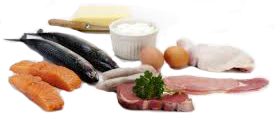
Iodine is a mineral that we need in very small amounts. It’s used by the body to make thyroid hormone which is essential for normal growth and metabolism. Many New Zealanders are mildly iodine deficient due to low levels of iodine in our soil. Mild to moderate iodine deficiency can cause goitre and hypothyroidism, but severe iodine deficiency during pregnancy has serious consequences as it impairs mental development in the foetus. To get enough iodine:
- Buy commercial bread as these are fortified with iodised salt
- Eat more fish and seafood; eggs and dairy products
- Limit processed foods which contain a lot of non-iodised salt
- If pregnant or breastfeeding – take 150mcg of iodine supplement daily
- If using salt at home – make sure it’s iodised!
Iron
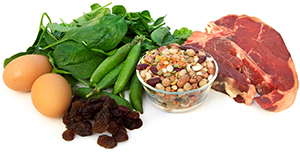 Iron is essential to life as it transports and stores oxygen around in our body. Iron deficiency is the most common nutritional deficiency worldwide – and iron is particularly important for women of reproductive age. There are two types of iron in our diet: haem iron which comes from animal sources (e.g. red meat) and non-haem iron from plant sources (e.g. green leafy vegetables, legumes, tofu). The iron in plant foods is not as well absorbed by the body as that from meat. Tips to help the body better absorb the iron from plant foods:
Iron is essential to life as it transports and stores oxygen around in our body. Iron deficiency is the most common nutritional deficiency worldwide – and iron is particularly important for women of reproductive age. There are two types of iron in our diet: haem iron which comes from animal sources (e.g. red meat) and non-haem iron from plant sources (e.g. green leafy vegetables, legumes, tofu). The iron in plant foods is not as well absorbed by the body as that from meat. Tips to help the body better absorb the iron from plant foods:
- Eat vitamin C rich foods with your meal (i.e. citrus fruits, kiwi fruit, capsicum)
- Have meat/fish/poultry with the plant-based sources
- Avoid drinking tea up to one hour before and after a meal
LSA
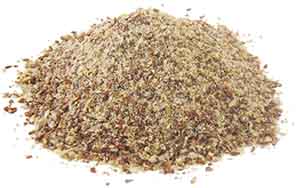 LSA is a ground mixture of Linseeds, Sunflower seeds and Almonds. LSA is full of good nutrients: B-vitamins and fibre as well as those essential fats that the body can’t make on its own (omega-3 and omega-6). Two tablespoons of LSA provide around 3g of fibre which is similar to the amount of fibre in two slices of Vogel bread, and counting towards your recommended daily fibre intake for good health. It’s a tasty mixture great for adding a nutrition boost to your cereal, as a porridge topping, to smoothies, or in baking.
LSA is a ground mixture of Linseeds, Sunflower seeds and Almonds. LSA is full of good nutrients: B-vitamins and fibre as well as those essential fats that the body can’t make on its own (omega-3 and omega-6). Two tablespoons of LSA provide around 3g of fibre which is similar to the amount of fibre in two slices of Vogel bread, and counting towards your recommended daily fibre intake for good health. It’s a tasty mixture great for adding a nutrition boost to your cereal, as a porridge topping, to smoothies, or in baking.
Oats
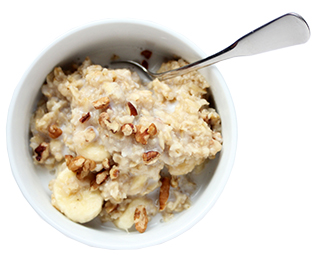 Oats are a ‘must have’ pantry food. They are cheap, versatile and full of goodness. Oats have a low-medium GI which provides a slow release of energy. One ½ cup serve of rolled oats contains 5g of fibre – which helps with digestion and keeps you fuller for longer. Oats also contain a special type of soluble fibre, beta-glucans, which have been shown to help lower total blood cholesterol when eaten as part of an overall healthy diet.
Oats are a ‘must have’ pantry food. They are cheap, versatile and full of goodness. Oats have a low-medium GI which provides a slow release of energy. One ½ cup serve of rolled oats contains 5g of fibre – which helps with digestion and keeps you fuller for longer. Oats also contain a special type of soluble fibre, beta-glucans, which have been shown to help lower total blood cholesterol when eaten as part of an overall healthy diet.
- Add oats to smoothies
- Make porridge, muesli or oaty pancakes
- Use as a healthier fruit crumble topping
Omega-3
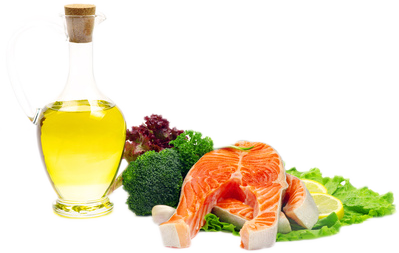 Omega-3 is an essential type of fat which our bodies can’t make, so it needs to come from our diet. There are two types of omega-3: short-chain ALA found in plant sources such as canola oil, flaxseeds and walnuts; and long-chain EPA and DHA found in fish (especially oily) and seafood. Long-chain omega-3 is beneficial for lowering blood pressure and cholesterol, as well as being important for brain and vision throughout life. The best way of getting enough long-chain omega-3 is to eat (oily) fish at least twice per week. For vegetarians, increasing your intake of plant sources of omega-3 is beneficial; if taking a fish oil supplement, make sure it provides at least 250mg EPA+DHA per day.
Omega-3 is an essential type of fat which our bodies can’t make, so it needs to come from our diet. There are two types of omega-3: short-chain ALA found in plant sources such as canola oil, flaxseeds and walnuts; and long-chain EPA and DHA found in fish (especially oily) and seafood. Long-chain omega-3 is beneficial for lowering blood pressure and cholesterol, as well as being important for brain and vision throughout life. The best way of getting enough long-chain omega-3 is to eat (oily) fish at least twice per week. For vegetarians, increasing your intake of plant sources of omega-3 is beneficial; if taking a fish oil supplement, make sure it provides at least 250mg EPA+DHA per day.
Quinoa
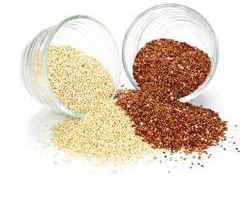 Quinoa is one of those new and often talked about foods on the supermarket shelf. It’s a wholegrain and being both gluten-free and a ‘complete protein’ (i.e. provides all essential amino acids) makes it a good alternative to people with gluten intolerance/coeliac disease as well as vegetarians. It’s very versatile in the kitchen – great in both cold and warm salads, as a replacement for rice or couscous, and added to casseroles to add extra bulk. Compared to other grains, quinoa has higher levels of protein, iron, calcium, magnesium, potassium and phytonutrients. So be sure to try out this exciting nutritious grain!
Quinoa is one of those new and often talked about foods on the supermarket shelf. It’s a wholegrain and being both gluten-free and a ‘complete protein’ (i.e. provides all essential amino acids) makes it a good alternative to people with gluten intolerance/coeliac disease as well as vegetarians. It’s very versatile in the kitchen – great in both cold and warm salads, as a replacement for rice or couscous, and added to casseroles to add extra bulk. Compared to other grains, quinoa has higher levels of protein, iron, calcium, magnesium, potassium and phytonutrients. So be sure to try out this exciting nutritious grain!
Sugar
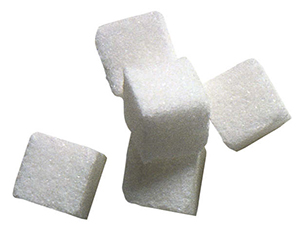 Sugar is hidden in many processed foods. The nutrition label only shows total sugars – so it is difficult to distinguish between what is added (e.g. refined sugar) and what is occurring naturally (e.g. in dried fruit). One tip is to look at the ingredients list and if ‘sugar’ is listed among the top three ingredients, then most of the total sugars is likely added. But sugar has many names and is often added in different forms further down the ingredient list. So, you also need to look out for the not so obvious names such as: glucose, fructose, corn syrup, molasses, invert sugar, dextrose, maltose, raw sugar, cane sugar, maltodextrin, lactose, fruit juice concentrate…
Sugar is hidden in many processed foods. The nutrition label only shows total sugars – so it is difficult to distinguish between what is added (e.g. refined sugar) and what is occurring naturally (e.g. in dried fruit). One tip is to look at the ingredients list and if ‘sugar’ is listed among the top three ingredients, then most of the total sugars is likely added. But sugar has many names and is often added in different forms further down the ingredient list. So, you also need to look out for the not so obvious names such as: glucose, fructose, corn syrup, molasses, invert sugar, dextrose, maltose, raw sugar, cane sugar, maltodextrin, lactose, fruit juice concentrate…
Vitamin D
 Vitamin D is often referred to as the ‘sunshine vitamin’ which is because we get the majority of our vitamin D from exposing our skin to sunlight (UVB rays). Vitamin D is important for healthy bones along with calcium. Vitamin D is found in small amounts in few foods (such as oily fish, eggs, and fortified foods such as Yellow Top milk). But as the vitamin D we get from these foods is limited it’s important to get outside and enjoy the sun – in a sensible way without getting sun burnt. The sun as a source of vitamin D is important for people of all skin colours.
Vitamin D is often referred to as the ‘sunshine vitamin’ which is because we get the majority of our vitamin D from exposing our skin to sunlight (UVB rays). Vitamin D is important for healthy bones along with calcium. Vitamin D is found in small amounts in few foods (such as oily fish, eggs, and fortified foods such as Yellow Top milk). But as the vitamin D we get from these foods is limited it’s important to get outside and enjoy the sun – in a sensible way without getting sun burnt. The sun as a source of vitamin D is important for people of all skin colours.
Water
 The human body can only last a few days without water. Water is essential to most bodily functions including regulating body temperature and transporting oxygen and nutrients. Dehydration can lead to kidney failure, and ultimately death! An average adult loses 2.5-3 litres of water daily – these losses must be replaced. Water requirements depend on age, body size, health status, metabolism, weather and physical activity. The body gets around 20% of its water requirements from foods we eat. The rest it needs from fluid intake such as water, milk, tea and coffee.
The human body can only last a few days without water. Water is essential to most bodily functions including regulating body temperature and transporting oxygen and nutrients. Dehydration can lead to kidney failure, and ultimately death! An average adult loses 2.5-3 litres of water daily – these losses must be replaced. Water requirements depend on age, body size, health status, metabolism, weather and physical activity. The body gets around 20% of its water requirements from foods we eat. The rest it needs from fluid intake such as water, milk, tea and coffee.
- Make water your household drink – 0 calories!
- Drink around 8 glasses of water/fluids each day
- Always carry a bottle of water with you
